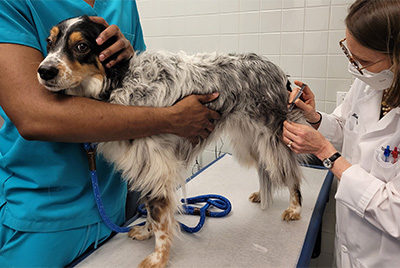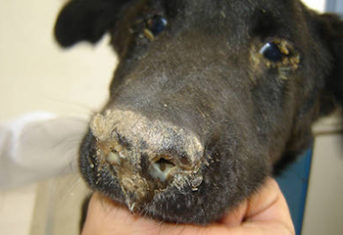Does a titer test mean my pet doesn’t need vaccines?

Does a titer test mean my pet doesn’t need vaccines?
I just finished reading Splendid Solution about Dr. Jonas Salk’s quest to develop a polio vaccine in the years following World War II. The vaccine’s development was considered a medical miracle, protecting children worldwide against polio, a crippling disease that left millions of healthy children dependent on braces and iron lungs. Today, the public is more wary of vaccines than ever, and vaccine skepticism affects some pet owners as well. Many pet owners hope titer testing will avoid the need for vaccination of their pet. This blogpost will address the use of titer testing in dogs and cats.
What is titer testing in veterinary medicine?
A titer is a blood test that measures the concentration of infection preventing blood proteins called antibodies. It is an estimation of the body’s immune response against a disease. For pet families looking to limit the number of vaccinations their dog receives, a titer test will indicate if there are sufficient naturally occurring antibodies present in the blood to protect the dog against developing a certain disease.
During titer testing, a patient’s blood sample is diluted until the antibody can no longer be measured. If a sample has been diluted twice, or 1:4, and a reaction is not seen, then the titer is 1:2. A titer of 1:32 has higher amounts of antibodies than a titer of 1:2. The 1:32 sample requires 5 dilutions before the antibody levels can no longer be measured. The protective titer is different for different diseases.
Titer testing is not available for all diseases
In day-to-day veterinary practice, titers are most often performed for canine distemper and canine parvovirus. Veterinarians will also perform titers for antibodies against leptospirosis, Lyme disease and feline immunodeficiency virus, but we use those titers as diagnostic tests, not to guide vaccination protocol. Rabies titers can be measured, but it is uncommon to do so.
Rabies requires vaccination
Most American municipalities require pets to be vaccinated for rabies due to public health concerns. A titer test will not meet the legal requirement for rabies vaccination. Additionally, travel to certain rabies-free countries requires a rabies titer following rabies vaccination as proof of vaccine efficacy. This is documented in a specially certified rabies titer report and ensures a traveling pet does not introduce rabies into the country. Pets traveling internationally are required to have an up-to-date rabies vaccination in order to return to the United States. I don’t know of any situations where a rabies titer exempts your pet from a rabies vaccination.
Titer Tests and International Health Certificates
Because every country has its own entry requirements, you need to do your homework before you travel internationally with your pet to ensure your pet meets the entry requirements for your destination country. Here are a few examples of countries and the vaccinations required for entry. Titers are not acceptable substitutes.
- Entry into the Bahamas requires your dog to have the six-in-one distemper vaccination. The six-in-one includes canine coronavirus vaccination.
- Cats traveling to Turks & Caicos Islands need the three-way feline distemper vaccine plus a feline leukemia virus vaccine, while dogs need a vaccination against leptospirosis.
All of this is a long answer to the question, if I do titer testing, can I skip vaccinating my pet? The short answer is: maybe – unless it’s the rabies vaccination, which is required. It’s always best to check with your veterinarian about substituting titer tests for vaccinations in your pet.

































